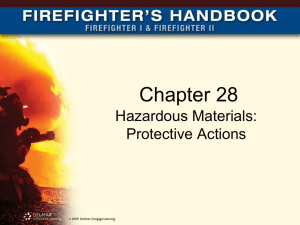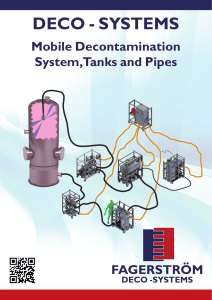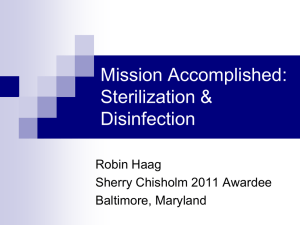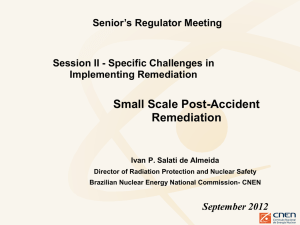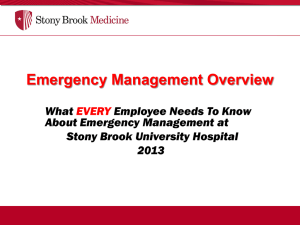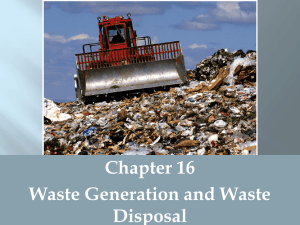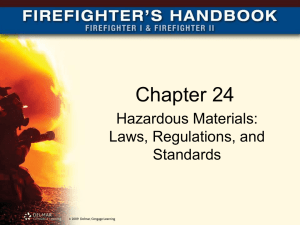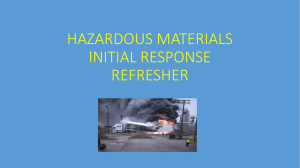Hazmat Ops Refresher PowerPoint
advertisement
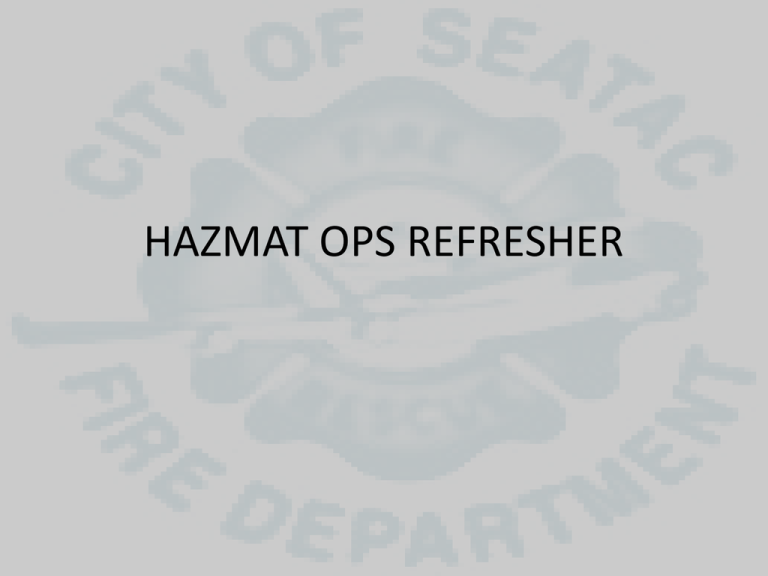
HAZMAT OPS REFRESHER Haz Mat Incidents • Involve a substance that: – Poses an unreasonable risk to: • People • Environment • Property – Has been or may be released from a container – May be on fire • Will be more complex than a “routine” incident Awareness Level 1–2 Awareness-Level Training Requirements • Governmental agencies – OSHA and EPA – U.S. Department of Justice, Office for Domestic Preparedness (ODP) • Requirements of authority having jurisdiction (AHJ) (1 of 2) Awareness Level 1–3 Awareness-Level Training Requirements • NFPA Standards – NFPA 472, Standard for Professional Competence of Responders to Hazardous Materials Incidents – NFPA 471, Recommended Practice for Responding to Hazardous Materials Incidents – NFPA 473, Standard for Competencies for EMS Personnel Responding to Hazardous Materials Incidents (2 of 2) Awareness Level 1–4 Awareness-Level Responsibilities • Recognizing the presence or potential presence of a hazardous material • Recognizing container type and identifying material • Transmitting information to appropriate authority and calling for assistance • Identifying actions to protect self and others • Establishing scene control Awareness Level 1–5 Operational-Level Rescue Actions • Conducting searches during reconnaissance or defensive activities • Conducting searches on the edge of the hot zone • Directing victims to the decontamination area • Assisting with decontamination while not coming into contact with the hazardous material itself • Assisting with the identification of victims • Giving instructions to a large number of people for mass decontamination Operational Level 4–6 Approaching the Scene Safely • Identify and evaluate problem locations and hazardous occupancies during emergency response planning. • Include remote observation/assessment steps in the emergency plan. • Always approach the scene from uphill, upwind, and upstream if at all possible. Operational Level (1 of 2) 2–7 Approaching the Scene Safely • Use binoculars, a spotting scope, a camera lens, or a sight scope for observation. • Report any unusual conditions to the telecommunications/dispatch center. • Use the assessment location as a temporary staging area if reconnaissance teams must (2 of 2) approach on foot. Operational Level 2–8 Incident Priorities • Life safety • Incident stabilization • Protection of property and the environment Operational Level 3–9 Assessments to Make Before Taking Action • • • • • • Risk to rescuers Ability of rescuers to protect themselves Probability of rescue Difficulty of rescue Capabilities and resources of on-scene forces Possibilities of explosions or sudden material releases • Available escape routes and safe havens • Constraints of time and distance Operational Level 3–10 Confinement • Controlling the product that has already been released from its container • Function — Minimizes the amount of contact the product makes with people, property, and the environment • Tactics – – – – – Absorption Adsorption Blanketing/covering Dam, dike, diversion, and retention Vapor suppression (1 of 2) Operational Level 4–11 Confinement (2 of 2) Operational Level 4–12 Absorption • A physical and/or chemical event occurring during contact between materials that have an attraction for each other • One material is retained in the other • Procedure — The absorbent is spread directly onto the hazardous material or in a location where the material is expected to flow • Refer to Skill Sheet 4–1. Note: After use, absorbents must be treated and disposed of as hazardous materials because they retain the properties of the materials they absorb Operational Level 4–13 Adsorption and Blanketing/Covering • Adsorption — The molecules of the hazardous material physically adhere to the material • Blanketing/covering — Covering the surface of the spill to prevent dispersion of materials Operational Level 4–14 Damming, Diking, Diversion, and Retention • A way to control the flow of liquid hazardous materials away from the point of discharge • Can be made by using earthen materials or materials carried on response vehicles • Procedure — Construct curbs that direct or divert the flow away from gutters, drains, storm sewers, flood-control channels, and outfalls • Refer to Skill Sheets 4–2 through 4–5. Note: Any construction materials that contact the spilled material must be properly disposed of. Operational Level 4–15 Vapor Suppression • The action taken to reduce the emission of vapors at a haz mat spill • Spills of flammable and combustible liquids may require fire-fighting foams. • Refer to Skill Sheet 4–6. Operational Level 4–16 Using Foams • Application methods – All fire-fighting foams (except fluoroprotein types) should not be plunged directly into the spill, but applied onto the ground at the edge of the spill and rolled gently onto the material. – Rainfall method — Spraying foam into the air over the target area in a fog pattern • Considerations – Water destroys and washes away foam blankets; do not use water streams in conjunction with the application of foam. – A material must be below its boiling point; foam cannot seal vapors of boiling liquids. Operational Level 4–17 Other Spill-Control Tactics • Ventilation — Controlling the movement of air by natural or mechanical means • Vapor dispersion – The action taken to direct or influence the course of airborne hazardous materials – Procedure: Using pressurized streams of water from handlines or unmanned master streams; streams create turbulence, which increases the rate of mixing with air and reduces the concentration of the hazardous material – Refer to Skill Sheet 4–7. (1 of 4) Operational Level 4–18 Other Spill-Control Tactics • Dispersion — The breaking up or dispersing of a hazardous material that has spilled on a solid or liquid surface • Dilution – The application of water to a water-soluble material to reduce the hazard – Is not typically used for spill control, but during decontamination operations – May be used when very small amounts of corrosive materials are involved – Refer to Skill Sheet 4–8. (3 of 4) Operational Level 4–19 Other Spill-Control Tactics • Dissolution — The process of dissolving a gas in water • Neutralization — The process of raising or lowering the pH of corrosive materials to render them netural (4 of 4) Operational Level 4–20 Products Most Often Involved in Haz Mat Incidents • • • • Flammable/combustible liquids Corrosives Anhydrous ammonia Chlorine Awareness Level 1–21 Hazardous Materials States (2 of 2) Awareness Level 1–22 Potential Ignition Sources at Haz Mat Scenes • • • • Open flames Static electricity Existing pilot lights Electrical sources • Internal combustion engines • Heated surfaces • Cutting and welding operations (1 of 2) Awareness Level 1–23 Potential Ignition Sources at Haz Mat Scenes • Radiant heat • Heat caused by friction or chemical reactions • Cigarettes • Cameras • Road flares (2 of 2) Awareness Level 1–24 Potential Ignition Sources in Explosive Atmospheres • • • • Opening or closing a switch or electrical circuit Turning on a flashlight Operating a radio Activating a cell phone Awareness Level 1–25 Routes of Entry • Inhalation — Breathing through the nose or mouth • Ingestion — Through the mouth by means other than simple inhalation • Injection — Through a puncture or break in the skin (1 of 3) Awareness Level 1–26 Routes of Entry • Absorption — Through the skin or eyes • Penetration — Radioactive particles and energy waves (2 of 3) Awareness Level 1–27 Routes of Entry Chemicals often have multiple routes of entry. (3 of 3) Awareness Level 1–28 UN/DOT Hazard Classes • • • • Class 1: Explosives Class 2: Gases Class 3: Flammable and combustible liquids Class 4: Flammable solids, spontaneously combustible materials, and dangerous-whenwet materials • Class 5: Oxidizers and organic peroxides (1 of 2) Awareness Level 2A–29 UN/DOT Hazard Classes • Class 6: hazard • Class 7: • Class 8: • Class 9: Poison (toxic) and poison inhalation Radioactive materials Corrosive materials Miscellaneous dangerous goods (2 of 2) Awareness Level 2A–30 UN Commodity Identification Numbers • A four-digit number assigned to each hazardous material listed in the current ERG – Often displayed on placards, labels, orange panels, and/or white diamonds – May be preceded by the letters NA or UN – Also appears on shipping papers • Assists first responders in identifying the material and referencing it in the ERG (1 of 4) Awareness Level 2A–31 UN Commodity Identification Numbers • Display methods for UN commodity identification numbers – In a white rectangle inside a placard between the placard symbol and hazard class – In an orange rectangle beneath the placard – On a plain white square-on-point display configuration having the same outside dimensions as a placard (2 of 4) Awareness Level 2A–32 UN Commodity Identification Numbers (3 of 4) Awareness Level 2A–33 UN Commodity Identification Numbers • Must be displayed on the following containers/packages: – Rail tank cars – Cargo tank trucks – Portable tanks – Bulk packages – Vehicle containers containing large quantities of hazardous materials – Certain nonbulk packages (4 of 4) Awareness Level 2A–34 Parts of a DOT Placard Hazard Symbol Background Color Diamond shaped 4-Digit ID Number or Hazard Class Designation Hazard Class Number Awareness Level 2A–35 Containers on Which DOT Placards May Be Found • • • • • Bulk packages Rail tank cars Cargo tank vehicles Portable tanks Unit load devices over 640 cubic feet (18 m3) in capacity containing hazardous materials • Certain nonbulk containers Awareness Level 2A–36 DOT Placard Color Codes Explosive Oxidizer Health Hazard Water Reacative Awareness Level Flammable Nonflammable Gas 2A–37 DOT Symbols Explosive Poison Oxidizer Radioactive Corrosive Awareness Level Flammable Nonflammable Gas 2A–38 NFPA 704 Flammability Health Instability (1 of 8) Awareness Level 2A–39 NFPA 704 • Provides a method for indicating the presence of hazardous materials at: – Commercial facilities – Manufacturing facilities – Institutional facilities – Other fixed-storage facilities (2 of 8) Awareness Level 2A–40 NFPA 704 • Not designed for the following situations: – Transportation – General public use – Nonemergency occupational exposures – Explosive and blasting agents – Chronic health hazards – Etiologic agents, and other similar hazards (3 of 8) Awareness Level 2A–41 NFPA 704 • Benefits of NFPA 704 – Provides an appropriate signal to first responders that hazardous materials are present – Identifies the general hazards and degree of severity for health, flammability, and instability – Provides immediate information necessary to protect lives of the public and emergency response personnel (4 of 8) Awareness Level 2A–42 NFPA 704 • Health — Blue – 4 — Severe hazard – 3 — Serious hazard – 2 — Moderate hazard – 1 — Slight hazard – 0 — Minimal hazard (5 of 8) Awareness Level 2A–43 NFPA 704 • Flammability — Red – 4 — Flammable gases, volatile liquids, pyrophoric materials – 3 — Ignites at ambient temperatures – 2 — Ignites when moderately heated – 1 — Must be preheated to burn – 0 — Will not burn (6 of 8) Awareness Level 2A–44 NFPA 704 • Instability — Yellow – 4 — Capable of detonation or explosive decomposition at ambient conditions – 3 — Capable of detonation or explosive decomposition with strong initiating source – 2 — Violent chemical change possible at elevated temperature and pressure – 1 — Normally stable, but becomes unstable if heated – 0 — Normally stable (7 of 8) Awareness Level 2A–45 NFPA 704 • Special hazards – Located at 6 o’clock – Have no special background although white is most often used – May contain one of two special symbols • W — Unusual reactivity with water • OX — Oxidizer (8 of 8) Awareness Level 2A–46 Shipping Paper Identification • Air transport – Shipping paper name — Air bill – Location of shipping paper — Cockpit – Responsible party — Pilot • Highway transport – Shipping paper name — Bill of lading – Location of shipping paper — Vehicle cab – Responsible party — Driver Awareness Level (1 of 2) 2B–47 Shipping Paper Identification • Rail transport – Shipping paper name — Waybill/consist – Location of shipping paper — Engine or caboose – Responsible party — Conductor • Water transport – Shipping paper name — Dangerous cargo manifest – Location of shipping paper — Bridge or pilothouse – Responsible party — Captain or master (2 of 2) Awareness Level 2B–48 U.S. MSDS Information • Top — Chemical Identity • Section I — Manufacturer’s ID and Information • Section II — Hazardous Ingredients • Section III — Physical and Chemical Characteristics • Section IV — Fire and Explosion Hazard Data (1 of 2) • Section V — Reactivity (Instability) Data Awareness Level 2B–49 U.S. MSDS Information • Section VI — Health Hazard Data • Section VII — Precautions for Safe Handling and Use • Section VIII — Control Measures (2 of 2) Awareness Level 2B–50 Emergency Response Guidebook • The Emergency Response Guidebook (ERG) is primarily for use at a dangerous goods/hazardous materials incident occurring on a highway or railroad. • Explosives are not listed individually but appear under the general heading Explosives on the first page of the ID Number Index and alphabetically in the Name of Material index. (1 of 2) Awareness Level 2B–51 Emergency Response Guidebook • The letter P following the Guide number in the yellow-bordered and blue-bordered pages identifies those materials that present a polymerization hazard under certain conditions. • First responders should be familiar with the ERG before using it in an emergency! (2 of 2) Awareness Level 2B–52 ERG ID Number Index (Yellow-Bordered Pages) • Index hazardous materials in numerical order of their 4-digit ID numbers • Follow ID number with material’s assigned ERG Guide number followed by the material’s name • Highlight substances that release toxic inhalation hazard (TIH) gases Awareness Level 2B–53 Using the ID Number Index • Example questions: What material has the ID number 1090? Is this material a TIH? What guide page should be consulted? (1 of 2) Awareness Level 2B–54 Using the ID Number Index (2 of 2) Awareness Level 2B–55 ERG Material Name Index (Blue-Bordered Pages) • Alphabetically index hazardous materials by name • Follow the material’s name with the ERG Guide number and the material’s 4-digit ID number • Highlight substances that release toxic inhalation hazard (TIH) gases Awareness Level 2B–56 Using the Material Name Index • Example questions: What guide page would be used for Sulphuric (Sulfuric) acid? Is this material a TIH? (1 of 2) Awareness Level 2B–57 Using the Material Name Index (2 of 2) Awareness Level 2B–58 Initial Action Guides (Orange-Bordered Pages) • Provide safety recommendations and general hazard information • Present each guide in a two-page format – Potential hazards section – Public safety section – Emergency response section (1 of 2) Awareness Level 2B–59 Initial Action Guides (Orange-Bordered Pages) (2 of 2) Awareness Level 2B–60 Initial Action Guides — Potential Hazards Section • Describes potential fire and explosion hazards and health effects upon exposure • Lists highest potential first • Should be consulted first, allowing first responders to make decisions regarding the protection of the emergency response team as well as the surrounding population Awareness Level 2B–61 Table of Initial Isolation and Protective Action Distances (Green-Bordered Pages) • List TIH materials by ID number in Table of Initial Isolation and Protective Action Distances • Include water-reactive materials that produce toxic gases in Table of Water-Reactive TIH Materials Awareness Level 2B–62 Using the Table of Initial Isolation and Protective Action Distances • Example questions: Assume you are responding to a small spill involving a material with ID No. 1953, liquified gas, flammable, poisonous, not otherwise specified (n.o.s.) (Inhalation Hazard Zone B). What is the initial isolation distance? What distance should persons downwind be protected during the day? (1 of 2) Awareness Level 2B–63 Using the Table of Initial Isolation and Protective Action Distances (2 of 2) Awareness Level 2B–64 Small Spills vs. Large Spills • Small spill — A spill that involves a single, small package (such as a drum containing up to approximately 53 gallons [200 L], a small cylinder, or a small leak from a large package • Large spill — A spill that involves a spill from a large package, or multiple spills from many small packages Awareness Level 2B–65 Initial Isolation Distance • Distance within which all persons are considered for evacuation in all directions from the actual spill/leak source Awareness Level 2B–66 Protective Action Distance • A downwind distance from a spill/leak source within which protective actions should be implemented (steps taken to preserve the health and safety of emergency responders and the public) Awareness Level 2B–67 Hazard Control Zones • Provide scene control – Protect responders from interference by unauthorized persons – Help regulate movement of first responders – Minimize contamination • Divide the levels of hazard of an incident – Hot zone – Warm zone – Cold zone (1 of 2) Awareness Level 3–68 Hazard Control Zones (2 of 2) Awareness Level 3–69 Hot Zone • An area surrounding an incident that has been contaminated or has the potential to become contaminated by a released material • Generally the same as the isolation distance and could include the protective action zone Awareness Level 3–70 Warm Zone • An area abutting the hot zone and extending to the cold zone • Considered safe for workers to enter without special protective clothing (until decontamination starts) unless they are assigned a task requiring increased protection • Used as a buffer between the hot and cold zones and the place to decontaminate personnel and equipment exiting the hot zone Awareness Level 3–71 Cold Zone • Encompasses the warm zone and is used to carry out all other support functions of the incident or haz mat operations • Workers in the cold zone are not required to wear personal protective clothing Awareness Level 3–72 Properties of Hazardous Materials • Flammable, explosive, or combustible range — The percentage of the gas or vapor concentration in air that will burn or explode if ignited (4 of 13) Operational Level 1–73 Properties of Hazardous Materials • LEL/LFL (Lower explosive limit/Lower flammable limit) — The lowest concentration that will produce a flash of fire when an ignition source is present • UEL/UFL (Upper explosive limit/Upper flammable limit) — The highest concentration that will produce a flash of fire when an ignition source is present (5 of 13) Operational Level 1–74 Properties of Hazardous Materials • BLEVE (Boiling Liquid Expanding Vapor Explosion) — Occurs when a liquid within a container is heated, causing the material inside to boil or vaporize beyond the vessel’s ability to relieve the excess pressure • Melting point — Temperature at which a solid substance changes to a liquid state at normal atmospheric pressure (8 of 13) Operational Level 1–75 Properties of Hazardous Materials • Vapor density — Weight of a given volume of pure vapor or gas compared to the weight of an equal volume of dry air at the same temperature and volume (9 of 13) Operational Level 1–76 Properties of Hazardous Materials • Solubility — The percentage of a material (by weight) that will dissolve in water at ambient temperature – Non-water-soluble liquids remain separate when combined with water; water-soluble liquids mix easily when combined with water. – Water-soluble agents usually cause upper respiratory tract infection, quickly resulting in coughing and throat irritation. – Partially water-soluble agents penetrate into the lower respiratory systems causing delayed symptoms that include breathing difficulties, pulmonary edema, and coughing up blood. (10 of 13) Operational Level 1–77 Properties of Hazardous Materials • Miscibility/immiscibility — The degree or readiness with which two or more gases or liquids are able to mix with or dissolve into each other – Miscible — Liquids that dissolve into each other – Immiscible — Liquids that do not readily dissolve into each other • Specific gravity — Ratio of the density (heaviness) of a material to the density of some standard material at standard conditions (11 of 13) of pressure and temperature Operational Level 1–78 Types of Radiation • Alpha particles • Beta particles • Gamma rays • X-rays • Neutrons Operational Level 1–79 EPA Levels of Protection • Note: The following information is taken from the OSHA requirements for EPA levels of protective equipment. The NFPA requirements (listed in Hazardous Materials for First Responders, 3rd ed.) may differ slightly. Operational Level 5–80 EPA Level A Ensemble • Components – Vapor protective suit – Pressure-demand, full-face SCBA – Inner chemical-resistant gloves – Chemical-resistant safety boots – Two-way radio communication – Cooling system (optional) – Outer gloves (optional) – Hard hat (optional) Operational Level (1 of 3) 5–81 EPA Level A Ensemble • Protection provided — Highest available level of respiratory, skin, and eye protection from solid, liquid, and gaseous chemicals • Used in the following situations: – The chemical(s) have been identified and have high level of hazards to respiratory system, skin, and eyes – Substances are present with known or suspected skin toxicity or carcinogenity – Operations must be conducted in confined or poorly ventilated areas (2 of 3) Operational Level 5–82 EPA Level A Ensemble • Limitations – Protective clothing must resist permeation by the chemical or mixtures present – Ensemble items must allow integration without loss of performance (3 of 3) Operational Level 5–83 EPA Level B Ensemble • Components – Liquid splash-protective suit – Pressure-demand, full-facepiece SCBA – Inner chemical-resistant gloves – Chemical-resistant safety boots – Two-way radio communications – Hard hat – Cooling system (optional) – Outer gloves (optional) (1 of 3) Operational Level 5–84 EPA Level B Ensemble • Protection provided — Provides same level of respiratory protection as Level A, but less skin protection; provides liquid splash protection, but no protection against chemical vapors or gases. • Limitations – Protective clothing items must resist penetration by the chemicals or mixtures present – Ensemble items must allow integration without loss of performance (2 of 3) Operational Level 5–85 EPA Level B Ensemble • Used in the following situations: – The chemical(s) have been identified but do not require a high level of skin protection – Initial site surveys are required until higher levels of hazards are identified – The primary hazards associated with site entry are from liquid and not vapor contact (3 of 3) Operational Level 5–86 EPA Level C Ensemble • Components – Support Function Protective Garment – Full-facepiece, air-purifying, canister-equipped respirator – Chemical-resistant gloves and safety boots – Two-way communications system – Hard hat – Faceshield (optional) – Escape SCBA (optional) Operational Level (1 of 3) 5–87 EPA Level C Ensemble • Protection provided — The same level of skin protection as Level B, but a lower level of respiratory protection; provides liquid splash protection but no protection from chemical vapors or gases • Limitations – Protective clothing items must resist penetration by the chemical or mixtures present – Chemical airborne concentration must be less than IDLH levels – The atmosphere must contain at least 19.5% (2 of 3) oxygen Operational Level 5–88 EPA Level C Ensemble • Used in the following situations: – Contact with site chemical(s) will not affect the skin – Air contaminants have been identified and concentrations measured – A canister is available which can remove the contaminant – The site and its hazards have been completely characterized (3 of 3) Operational Level 5–89 EPA Level D Ensemble • Components – Coveralls – Safety boots/shoes – Safety glasses or splash goggles – Gloves (optional) – Escape SCBA (optional) – Faceshield (optional) chemical • Protection provided — No respiratory protection; minimal skin protection Operational Level (1 of 2) 5–90 EPA Level D Ensemble • Used in the following situations: – The atmosphere contains no known hazard – Work functions preclude splashes, immersion, potential for inhalation, or direct contact with hazard chemicals • Limitations – This level should not be worn in the Hot Zone – The atmosphere must contain at least 19.5% (2 of 2) oxygen Operational Level 5–91 Categories of Decontamination • Gross decontamination – Quickly removing the worst surface contamination, usually by rinsing with water from handheld hoselines, emergency showers, or other water sources – Performed on the following people in the following situations: • Entry team personnel before technical decontamination • Victims during emergency decontamination • Persons requiring mass decontamination (1 of 4) Operational Level 6–92 Categories of Decontamination • Emergency decontamination – Removing contamination on individuals in potentially lifethreatening situations with or without the formal establishment of a decontamination corridor – A type of gross decontamination • Technical (formal) decontamination – Using chemical or physical methods to thoroughly remove contaminants from responders (primarily entry team personnel) and their equipment – Conducted within a formal decontamination line or corridor following a gross decontamination (2 of 4) Operational Level 6–93 Categories of Decontamination • Mass decontamination — Conducting gross decontamination of multiple people at one time • Secondary decontamination — Taking a shower after having completed a technical decontamination • Definitive decontamination — Decontaminating further after technical decontamination (3 of 4) Operational Level 6–94 Categories of Decontamination • Patient decontamination — Decontaminating injured patients or victims • Buddy decontamination — Performing decontamination between entry team personnel (or others), making it easier to rinse difficult-toreach areas such as the back and backs of legs and knees • Self decontamination — Conducting emergency decontamination on oneself, usually by rinsing with water or using a blotting/ absorption method (4 of 4) Operational Level 6–95 Importance of Scene Control Procedures • First responders must direct victims to a safe location to await decontamination and prevent victims from leaving the scene. • Decontamination prevents secondary contamination to others. • All first responders must be sure to also know the department’s plan for evacuation of uncontaminated persons from the hazard area. Operational Level 6–96 Decontamination Methods • Wet – Washing the contaminated surface with solutions or flushing with a hose stream or safety shower – Usually necessitates the collection of runoff water in wading pools or other liquid-retaining devices • Dry – Scraping, brushing, and absorption – May be as simple as removing contaminated clothing and putting into a 55-gallon (208 L) storage bag – Does not create large amounts of contaminated runoff (1 of 2) Operational Level 6–97 Decontamination Methods • Physical – Removes the contaminant from a contaminated person without changing the material chemically – The contaminant is contained for disposal • Chemical – To make the contaminant less harmful by changing it through some kind of chemical process (2 of 2) Operational Level 6–98 Steps in Emergency Decontamination 1. Remove the victim from the contaminated area. 2. Wash immediately any exposed body parts with flooding quantities of water. 3. Remove victim’s clothing and/or PPE rapidly – if possible, cutting from the top down in a matter that minimizes the spread of contaminants. (1 of 2) Operational Level 6–99 Steps in Emergency Decontamination 4. Perform a quick cycle of head-to-toe rinse, wash, and rinse. 5. Transfer the victim to treatment personnel for assessment, first aid, and medical treatment. 6. Ensure that ambulance and hospital personnel are told about the contaminant involved. (2 of 2) Operational Level 6–100 Factors to Consider when Choosing a Decontamination Site • Accessibility – Must be away from hazards, but adjacent to the hot zone – Crucial time periods to consider • • • • Travel time in the hot zone Time allotted to work in the hot zone Travel time back to the decontamination site Decontamination time (1 of 4) Operational Level 6–101 Factors to Consider when Choosing a Decontamination Site • Terrain and surface material – The decontamination site ideally slopes toward the hot zone. – Diking around the site prevents accidental contamination escaping. – It is best if the site has a hard, nonporous surface to prevent ground contamination. – When a hard-surface driveway, parking lot, or street is not accessible, some type of impervious covering may be used to cover the ground. – Use covers or sheeting to form the decontamination (2 of 4) corridor regardless of whether the surface is porous. Operational Level 6–102 Factors to Consider when Choosing a Decontamination Site • Lighting (and electrical supply) – A site illuminated by streetlights, floodlights, or other type of permanent lighting reduces the need for portable lighting • Drains and waterways – Avoid locating a site near storm or sewer drains, ponds, ditches, and other waterways. • Water supply – Water (and sometimes detergent) must be available. (3 of 4) Operational Level 6–103 Factors to Consider when Choosing a Decontamination Site • Weather – Set up the site upwind in order to prevent the spread of contaminants into clean areas. – Make every attempt to shield victims from cold winds while they are removing protective clothing. (4 of 4) Operational Level 6–104 Decontamination Corridor Operational Level 6–105 AIR MONITORING • What is a normal Atmosphere? – Oxygen: – Carbon Monoxide: – LEL: – H2S: 20.8% 0 PPM 0% 0 PPM • When is the Atmosphere not normal? AIR MONITORING • 1% of volume is equal to 10,000 PPM • SO…WHAT DOES THAT MEAN TO ME? – What is happening if a monitored space is reading an Oxygen level of 20.3% O2 and zero on all other sensors? – Is there a problem? AIR MONITORING • Your meter is reading the following: – O2: – CO: – LEL: 20.7% 999 or HI .2% How much CO is in the space you are monitoring? AIR MONITORING • LEL of CO is 12.5% – 12.5% of CO equals 100% LEL meter reading – .125% of CO equals 1% LEL meter reading – 1% LEL meter reading equals 1250 PPM of CO How much CO is in the space you are monitoring? .2 % LEL meter reading of CO equals 2500 PPM. IDLH for CO is 1200 PPM QUESTIONS???
